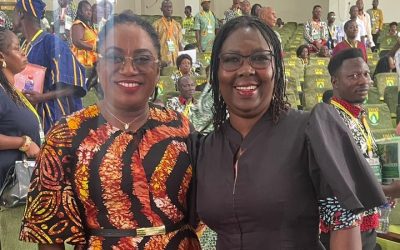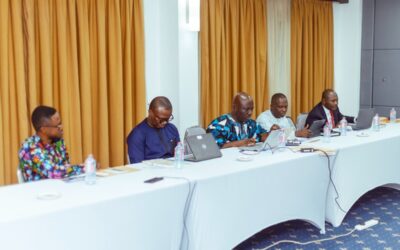Health and the well-being of a country’s citizens is one of the pillars of the Millennium Development Goals (MDGs). The commodification of primary healthcare delivery and its attendant expenditure which have normally denied accessibility to a larger section of the people have led to the proliferation of non-professionals in healthcare deliveries resulting in fatalities.
It is evident how countries in the West African Sub-Region and other countries especially, those in the developing countries or ‘third world’ or the ‘global south’ are grappling with every sector of their economies thereby, reducing the capacity to channel adequate resources in the public health sector. The doctor-to-patient or nurse-to-patient ratio in Ghana is indicative of this challenge. For example, in 2019, the ratio of nurses to population was 1:727, and in 2023, it dropped to 1: 600 while the ratio of doctors to the population stood at 1: 6,899 and dropped to 1: 4,000 in 2023.
Health care delivery by natives in their various communities as well as midwifery or the offering of assistance to pregnant women in labor and circumcisions have been in existence with the people from time immemorial. These practices were being undertaken by people who were skilled in those fields and the people recognized them. They are referred to as ‘witch doctors’, native doctors, or ‘fetish priests’, in the local parlance, and depending on one’s religious background, a practitioner is referred to as a ‘Malam’ if the person is a Moslem, ‘juju man’ if the person is a traditionalist and ‘odiyefo’, when that person is seen to be Christian. There are also the Gurus who are steeped in the Eastern Oriental Mysticisms, who all provide some level of healthcare solutions which have defied even the current and most advanced technologies in health sciences.
The realization of the relevance of traditional and alternative healthcare delivery led Dr. Oko Ampofo to establish the Center for Research into Plant Medicine in Mampong in 1975. Consistently, other institutions have been established to complement and expand the activities of practitioners in traditional and alternative healthcare delivery.
Institutions such as the Center for Scientific and Industrial Research (CSIR), Center for Plant Medicine Research (CPMR), and with the assistance of Japan, the Nouguchi Memorial Institute (NMI) have been established to research into the efficacy and toxicity of herbs identified as having active agents for the cure of certain disease conditions and to enhance efficiency in administering of these herbs by training ‘herbal pharmacists’, and the preservation of herbal medicines. They also offer expert advice on the cultivation of herbs and good practices of preserving the ecological environment suitable for certain rare herbal plant species.
Because of the global recognition given to the relevance of traditional herbal medicine practice by the World Health Organization (WHO) in the Alma-Ata Declaration of 1978, the World Health Organization-Africa Region (WHO-AFRO), and the West Africa Health Organization (WAHO), it became imperative for the establishment of a body to oversee the overall activities in the practice as well as the practitioners in Ghana. This led to the Traditional Medicine Practice Council (TMPC), being established by an Act of Parliament, Traditional Medicine Practice Act 2000 (Act 575), with the mandate to promote, control, and regulate the practice and assist practitioners in the discharge of their services.
ROLE:
With a vision to be an internationally acclaimed regulatory agency for Traditional and Complementary/Alternative Medicine practices and the mission to promote, control, and regulate Traditional and Alternative Medicine practices by the formulation, implementation, coordination, monitoring, and evaluation of policies and programs thereby, contributing to the national development agenda, the TMPC over the years has strived to translate these into achievable objectives.
Consequently, challenges, gaps and lessons learned during a performance assessment of the Council under the three thematic areas of the Growth and Poverty Reduction Strategy, {GPRSII, 2006-2009} implementation, resulted in a proposed three-year medium-term plan for the period {2016-2018} by the Council.
The Alma Ata Declaration of 1978 by the World Health Organization {WHO}, formally launched primary healthcare delivery and this advised the integration of Traditional and Alternative Medicine {TAM} into the mainstream healthcare system in order to improve coverage and accessibility since over 70% of people in developing countries rely on traditional and alternative medicine for their primary healthcare. This compelled government to plan, promote, and develop safe, quality, and efficacious TAM to be harmoniously integrated into the national healthcare delivery system in the country. And currently, there are about 55 piloting centres across the country where, TAM services are being offered in government district hospitals with plans to extend the program to other districts.
FUNCTIONS:
The key functions of the Agency as based on the relevant provisions of the above-mentioned law include the following:
- Set standards for the practice of traditional medicine;
- Issue a certificate of registration to a qualified practitioner and license premises for a practice;
- Determine and enforce a code of ethics for traditional medicine practice in conjunction with an association of traditional medicine practitioners recognized by the Minister of Health referred to in this Act as “the Association”;
- Promote and support training in traditional medicine;
- Approve in consultation with such educational and research institutions as it may determine the curriculum for training in traditional medicine in the institutions;
- Collaborate with the Ministry to establish centers for the provision of traditional medical care within the national health care delivery system;
- Advise the Minister on matters relating to and affecting the practice of traditional medicine;
- Collaborate with the appropriate agencies for large-scale cultivation of medicinal plants and for the preservation of bio-diversity;
- Advise the Food and Drugs Board in writing on rules for the registration, advertisement, manufacture, packaging, preparation, labelling, sale, supply, exportation and importation of any herbal medicine;
- Monitor fees payable by clients for services provided by practitioners; and
- Perform such other functions as are ancillary to the object of the Council.
Furthermore, a code of ethics for traditional medicine practitioners in relation to their chosen profession, their patients, between their colleague practitioners as well as the public, were developed to guide practitioners in their chosen fields of practice. These are expected to ensure professionalism and best practices to bear on all who choose to be in the traditional medicine practice.
CHALLENGES:
It is important to note that, the TMPC as it existed and operating within Ghana’s ten regions had many challenges it was grappling with in relation to office accommodation for the head office staff and its regional offices and now that there is an increase in the number of regions, this very challenge is going to exacerbate. Logistics in terms of vehicles for the head office and the regional office operations is another challenge. Furthermore, office furniture for offices is in adequate where it exists and some offices, it is a luxury to find a fully fitted chair and desk for an officer to comfortably work on.
Due to these challenges, the TMPC finds it difficult to increase the number of staff needed for effective monitoring of the operations of practitioners and especially those in the rural areas where the majority of them are located.
CONCLUSION AND RECOMMENDATIONS:
Currently, with the number of people depending on natural or traditional forms of healthcare delivery for their primary and in most cases specialized healthcare needs, it is evident that the TMPC holds a lot of potential in complementing the primary healthcare needs of the allopathic/medical healthcare delivery in the country. Given this, it is recommended that the TMPC needs to be resourced logistically, and with the necessary infrastructure that will aid in its monitoring, inspection, and regulatory activities to check the operations of practitioners in the country to be able to weed out the charlatans who are taking advantage of the vacuum created by the lack of adequate officers who will go round the country. There is also the need to increase the regional offices and staff due to the increment in the number of regions and the increase in numbers of the traditional and complementary/alternative medicine practitioners.
Numo Blafo III
Head, Corporate Affairs/Public Relations
Traditional Medicine Practice Council (TMPC)
02542380981





0 Comments